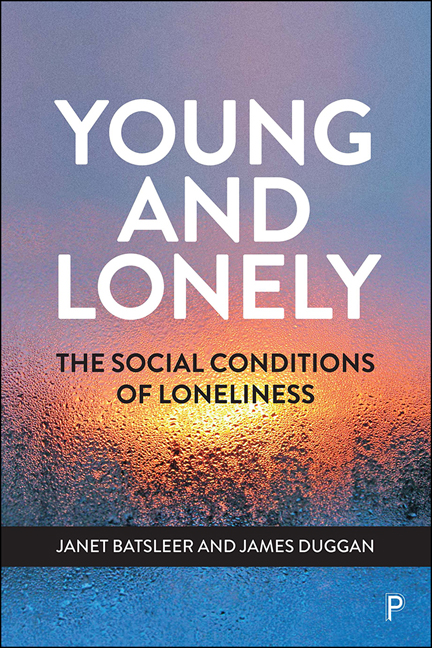Book contents
- Frontmatter
- Contents
- Notes on the Authors
- Acknowledgements
- Preface
- 1 Animate, Attune, Amplify
- 2 Finding Oneself a Loneliness Agenda
- 3 I’M New Here: Creating a New Research Project and A Young Person Led Research Agenda
- Part I The Social Conditions of Loneliness
- Part II The Experience of Loneliness
- Part III Building Friendship and Connection
- References
- Index
13 - Creativity and Solidarity as Method: the Example of Missing and Other Stories
Published online by Cambridge University Press: 18 March 2021
- Frontmatter
- Contents
- Notes on the Authors
- Acknowledgements
- Preface
- 1 Animate, Attune, Amplify
- 2 Finding Oneself a Loneliness Agenda
- 3 I’M New Here: Creating a New Research Project and A Young Person Led Research Agenda
- Part I The Social Conditions of Loneliness
- Part II The Experience of Loneliness
- Part III Building Friendship and Connection
- References
- Index
Summary
The partnership between academic research, youth work and creative arts practice was critical to the success of this research into loneliness. The immersive theatre performance Missing is presented in detail in this chapter to show how collaboration and creativity were harnessed before, during and after the performances to enable a living response to loneliness and friendship.
Missing was an immersive theatre performance that explored the way loneliness emerges in the life of a quite ordinary and academically successful 17-year-old girl, ‘Jessica’. Jessica is not without friends and has a part-time job with a small income and a social life. Rather than engaging as audience members, participants pieced together the evidence about why Jessica had ‘gone missing’. The audience was presented with a range of clues and stimuli, from video footage of her friends to a personal diary and her playlists, and they were invited to explore and interpret the fragments of ‘Jessica’s’ life for signs and experiences that eventually lead to questions of loneliness and connection.
In arriving at this production and its work in generating further conversations about young people and loneliness, the research team were weaving together three significant threads. Firstly, our research context in the Education and Social Research Institute at Manchester Metropolitan University is one of a research community with a strong interest in the aesthetic, the playful and the sensory, as part of what is termed a new materialist and more-than-human turn in research. Secondly, the context of youth work and informal education provides access to a practice of socio-cultural animation, a framing of work most fully developed in a European context in France, Italy and Spain but also present in the UK. Thirdly, and overlapping with both of these, there is the context of socially engaged applied theatre in which immersive theatre is currently the predominant form of practice. The Creative Director of The Horsfall Project and part of the 42nd Street creative team, Julie McCarthy, had extensive experience of this.
We can thus specify that the research-creation practice emerged from and was shaped by a number of communities (Springgay and Truman, 2018).
- Type
- Chapter
- Information
- Young and LonelyThe Social Conditions of Loneliness, pp. 147 - 160Publisher: Bristol University PressPrint publication year: 2020



